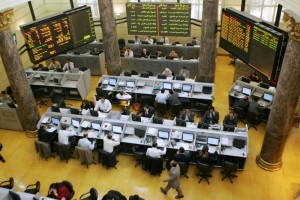
(AFP Photo)
Arab and foreign investors have taken to buying up large amounts of Egyptian stock since the beginning of this year, compared to Egyptian investors who have been selling much more heavily, an official within the Egyptian Exchange told state-run news agency MENA. He added that foreigners and other Arabs have more experience than Egyptians in dealing with financial crises, particularly those rooted in political conflict.
He said that net trading for foreigners and other Arabs since the beginning of this month has totalled EGP 173m. Sales made by other Arabs on Egypt’s stock exchange totalled EGP 128m, compared to EGP 188m seen for purchases, with net purchases reaching EGP 60m. Sales made by foreigners meanwhile totalled EGP 454m, compared to EGP 567m made in purchases, with net purchases reaching EGP 113m. Sales made by Egyptians during this period totalled EGP 1.2bn, compared to EGP 1.027bn made in purchases.
He added that Egypt’s stock market over the last 10 years has passed through a series of difficult circumstances, leaving Egyptian traders scared and confused as to how to proceed, with many acts of buying and selling largely being dictated at random. Trading done by foreigners however, has largely been done on a more informed basis, seeking to take advantage of financial crises and using them to their benefit.
He pointed out that Arabs and foreigners take to buying up large shares of stock during financial crises, taking advantage of drops in prices. Many Egyptians fear that the renewed outbreak of protests expected to begin on 30 June will cause stock market prices to fall once again. After the outbreak of the 25 January Revolution, Egypt’s stock market lost EGP 200bn; however, soon after share prices increased significantly, 25 separate times. The largest benefactors of these increases were other Arabs and foreigners who took to purchasing stocks immediately after the revolution.
He added that precautionary measures would not be placed on the stock exchange over fears of renewed protests on 30 June, saying that implementation of such measures would likely receive criticism from a number of parties. Local investors called for stock market officials to wait to implement any such measures, saying that they sought to avoid making the same mistakes of the past and reap the most benefits possible from the current situation.
Egypt’s stock exchange since the beginning of this month lost a total of EGP 36bn in market capital, largely the result of negative fallout from calls being made by some elements of the opposition to hold mass protests on 30 June.
Translated from MENA



